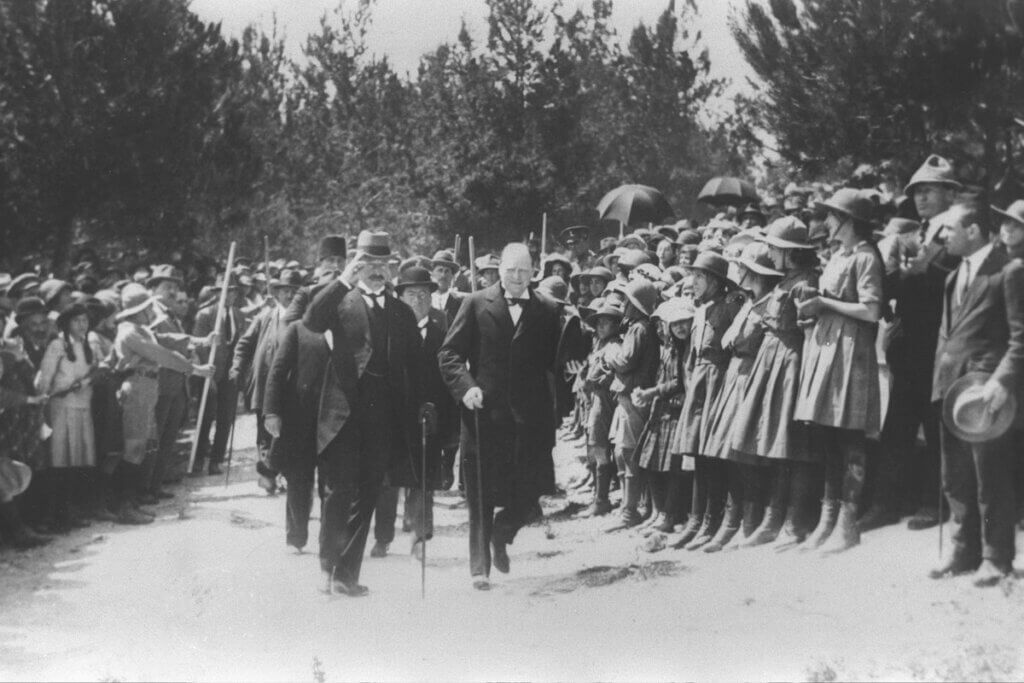Another speech fest at the UN General Assembly has come to a close. “Debates,” the week-long session is called. One by one, leaders of the UN’s 193 member states deliver high-minded declarations about what the world’s supreme governing body should or shouldn’t do.
As it happens, this year’s round of jaw-wagging coincides with the hundredth anniversary of the birth of an unfortunate situation the UN continues to bear responsibility for and has the ability to resolve — a situation one of its founding members created; arguably the oldest unresolved item on the UN’s 78-year-old decolonization agenda: the Palestinian people’s thwarted right to self-determination, as provided for by the UN’s predecessor, the League of Nations.
A hundred years ago today, on September 29, 1923, the League of Nations formally assigned Britain the role of Mandatory Power in Palestine. Its mission: to guide Palestine’s people out of colonialism, into independence.
Instead, in one of modern history’s most egregious acts of bad faith, duplicity, and cynicism, the world’s preeminent colonial power handed Palestine over to European colonists, dispossessing Palestine’s native people and sowing the seeds for a hundred years of bloody conflict and grief.
Britain’s fiduciary duty had been set forth in the 1919 Covenant of the League of the Nations. Article 22 of the Covenant stated:
“Certain communities formerly belonging to the Turkish Empire have reached a stage of development where their existence as independent nations can be provisionally recognized subject to the rendering of administrative advice and assistance by a Mandatory until such time as they are able to stand alone. The wishes of these communities must be a principal consideration in the selection of the Mandatory.” [emphasis added]
And:
“To those colonies and territories which as a consequence of the late war have ceased to be under the sovereignty of the States which formerly governed them and which are inhabited by peoples not yet able to stand by themselves under the strenuous conditions of the modern world, there should be applied the principle that the well-being and development of such peoples form a sacred trust of civilisation.” [emphasis added]
Who were these “peoples” whose “well being and development” Britain was instructed to hold in “sacred trust”? According to a 1917 British census, 92% of them were ‘Arabs’ (Muslim, Christian, and other non-Jewish minorities) and 8% Jewish (half of them indigenous Arab Jews).
Five years later, in October 1922 – poised to take up its Mandatory position – Britain completed another census. The results: 78% Muslim, 10% Christian and 11% Jewish.
Fully aware of these numbers, Britain tossed its fiduciary duty to decolonize Palestine and liberate its people out the window. Its rationale is well known – the Balfour Declaration.
In November 1917, in a single, sixty-seven-word sentence, Britain had already declared its intention to turn Palestine into a “national home” for 10% of its people and the rest of the world’s Jews, while referring to 90% of Palestine’s population as what they were not:
“His Majesty’s Government view with favour the establishment in Palestine of a national home for the Jewish people, and will use their best endeavours to facilitate the achievement of this object, it being clearly understood that nothing shall be done which may prejudice the civil and religious rights of existing non-Jewish communities in Palestine, or the rights and political status enjoyed by Jews in any other country.”
But Britain had other reasons to violate its Covenant duties.
“Britain had decided long before World War One — long before Weizmann and the Zionists came along and sold their project to the British War cabinet — that they needed to control Palestine,” Palestinian scholar Rashid Khalidi told Mondoweiss. “Palestine is the land terminus of the shortest route between the Gulf and the Mediterranean, and therefore the route to India. So it was absolutely vital strategically to the British Empire that they control Palestine.”
Of course, Balfour and his colleagues were also antisemites. Britain’s 1905 Alien Act – drafted by Balfour himself — was designed to keep European Jews out. What better place to send them than Palestine, where they could be put to good use?
Mondoweiss spoke about this with Israeli historian Avi Shlaim. British Prime Minister Lloyd George “had a perception of the Jews as being uniquely powerful worldwide; the Jews as having covert power; the Jews having control over international finance,” says Shlaim. “[By] aligning Britain, the British Empire, with the Zionists in the Middle East, Lloyd George was acting on a misperception; the misperception of Jewish power.”
So, Balfour, George, Churchill, and other British leaders needed no convincing when Chaim Weizmann came knocking. Still, between the inking of the Covenant and the drafting of Britain’s Palestine Mandate — in London, Paris, and San Remo, Italy — Weizmann moved heaven and earth to get Balfour incorporated into the Mandate, conferring legal status on the Zionist project.
He succeeded. Under the terms of the Mandate, in force on September 29, 1923, Britain would ensure Jewish immigration, the acquisition of citizenship by European Jews, “intensive” Jewish cultivation and “self-governing” Zionist institutions.
Palestine’s native people got tossed a few bones — “civil and religious rights” [not political], and a judicial system to “assure to foreigners, as well as to natives, a complete guarantee of their rights.”
“They didn’t ask for a Jewish state because that would have been asking for too much and it would have immediately alienated all the Arabs. So, they moderated the claim to a national home. And the British went along with it.”
Avi Shlaim
What was Britain’s true aim – the creation of a Jewish “national home” (whatever that meant), or an actual Jewish state? And how did the Zionists see themselves – as colonists, or Palestine’s true native people?
“[A] national home was a newfangled concept,” Avi Shlaim told Mondoweiss. “So, no one knew quite what it meant.”
“But the Zionist leaders had a very clear idea what they meant; they meant a state. They didn’t ask for a Jewish state because that would have been asking for too much and it would have immediately alienated all the Arabs. So, they moderated the claim to a national home. And the British went along with it.”
Hypocrisy and duplicity
“But there is a lot of hypocrisy on the British side in all of this,” says Shlaim. “The Zionists and the British knew from the beginning what they were doing; that they were enabling the systematic Zionist takeover of Palestine at the expense of the Palestinians.”
Hypocrisy indeed, and duplicity. “Balfour, Churchill and Lloyd George told Weizmann at a private dinner a few years [after the start of the Mandate] that what they meant by this obfuscating and opaque language was a Jewish state,” Palestinian historian Rashid Khalidi told Mondoweiss.
“There was no shame in the 20s and 30s about being a colonist. [They] understand perfectly that they were European settlers engaged in the colonial enterprise.”
Rashid Khalidi
As for the Zionists, settler-colonialism was in vogue back then. “There was no shame in the 20s and 30s about being a colonist,” Rashid Khalidi told Mondoweiss. “[They] understand perfectly that they were European settlers engaged in the colonial enterprise. The agency that’s purchasing a lot of this land is called the Jewish Colonization Agency!”
Palestinian legal scholar Noura Erekat puts it differently. “[The] Zionist project never envisioned Jews as being part of the Middle East,” Erekat told Mondoweiss. “Israel was seen by its founders very much as an extension of Europe and a site of Jewish settlement as a satellite state, but not part of the Middle East, culturally, ethnically, linguistically, politically.”
As always, the Zionists played the game both ways.
“Ussishkin and others who openly kind of talked about colonialism — and in fact thought that Britain would see them as settlers similar to the white settlers in Rhodesia — Ben-Gurion didn’t like that comparison,” Israeli historian and writer Ilan Pappe told Mondoweiss. “He said no, no, we are not the same. We are the indigenous people who came back home, a home usurped by the aliens, the foreigners.”
As for Britain, it knew perfectly well who Palestine’s indigenous people were, says Ilan Pappe. Junior members of the British government were even bothered by Whitehall’s duplicity. In the end, Britain was free to do as it pleased.
“The League of Nations was the body overseeing the Mandatory charters,” Pappe told Mondoweiss. “This international body was dominated by Britain and France and therefore they were the ones who actually would decide whether there was a violation or not.”
Why look back?
So, what are the practical implications of bad British faith and duplicity a century ago? Can British wrongs be set right?
“I think it’s important to check every chapter in that history of elimination with two realizations,” Ilan Pappe told Mondoweiss. “One is that Zionism – from its very inceptions until today – has not given up the idea of having as much of historical Palestine as possible with as few Palestinians as possible … Even liberal Zionism is not averse to that goal. It just has different ideas of how to do it. So that’s one realization. And that’s why we need to study that history. And secondly, the international Western coalition that enabled the beginning of the project … that international coalition is still today providing immunity for a state that Amnesty International has already defined as an apartheid state.”
“A hundred years ago is not that long. Acknowledging 100 years since the Palestine Mandate is placing that context front and center … It places responsibility where it belongs, primarily at the footsteps of Britain, but also at the footsteps of the international community.”
Noura Erekat
“Well, if we don’t look back at this and other aspects of history, we are liable to be prone to the kinds of myths and disinformation and falsehoods that have dominated the way people have seen this part of the world,” Rashid Khalidi told Mondoweiss. “Obviously, Zionists prefer to pretend that they did it all themselves; that it was just the hard work and the sweat of the pioneers and their sacrifice … But without the might of the British Empire, all of this would either have come to naught or would have been a much, much more difficult process.”
“A hundred years ago is not that long,” Noura Erekat told Mondoweiss. “Acknowledging 100 years since the Palestine Mandate is placing that context front and center … It places responsibility where it belongs, primarily at the footsteps of Britain, but also at the footsteps of the international community, because the Balfour Declaration was incorporated almost verbatim into the [1923] Palestine Mandate in the preambular text, where it thereafter becomes a central part of international law and therefore is no longer just British prerogative, but now becomes obligations of the international community to adhere to.”
International legal obligation
In legal jargon, the international community’s obligations are ‘live’.
According to Article 80 of the UN Charter, “nothing shall be construed in or of itself to alter in any manner the rights whatsoever of any states or any peoples or the terms of existing international instruments to which Members of the United Nations may respectively be parties.”
Put simply, says Canadian law expert Ardi Imseis, the international community’s obligation to decolonize Palestine and liberate its people, set forth in Article 22 of the Covenant, has not lapsed. That obligation has been inherited by today’s UN. In support of this view, Imseis cites the International Court of Justice’s 1971 ruling, Legal Consequences for States of the Continued Presence of South Africa in Namibia.
Para. 55 of Namibia stated: “[To] the question whether the continuance of a mandate was inseparably linked with the existence of the League, the answer must be that an institution established for the fulfillment of a sacred trust cannot be presumed to lapse before the achievement of its purpose.”
Will the international community finally fulfill its sacred trust to the Palestinian people? Not if Israel’s allies have a say. Resolution of the ‘conflict’ must be achieved through direct negotiation between the ‘parties’, they insist, untethered from international law.
In line with this stance, the U.S., Canada, and Britain, among others, are now urging the ICJ not to render an Advisory Opinion on the legal dimensions of Israel’s ‘prolonged’ occupation of the West Bank and East Jerusalem (strikingly parallel to South Africa in Namibia), as requested by the UN General Assembly last December. ICJ involvement would make ‘peacemaking’ harder, if not impossible, they argue – and the ‘peace process’ is the purview of the UN Security Council, not the General Assembly.
Cynics that they are, Israel’s allies know this isn’t so. They’re familiar with Article 80. So is the ICJ. Its ruling, sometime in 2025, will likely provide grist for another round of jaw-wagging on the floor of the UN General Assembly – many of its members former British colonies, incensed by the survival of British-Israeli settler-colonialism, a hundred years after it began.



If the history of the last century in Palestine is entirely one of Anglo-Zionist collusion, how does the Palestine White Paper of 1939 figure into this? It sharply restricted Jewish immigration there just as persecution in Europe not only by the Nazis but by the right-wing dictatorships to the east and southeast of Germany (and by Italy) were ramping up sharply (of course, the British and French empires, along with every country in the Western Hemisphere, kept their doors to Jewish and other anti-Nazi refugees locked tightly). The PWP can hardly be reconciled with any Zionist agenda.
White Man Speaks with Forked Tongue:
Text of Lord Balfour’s testimony as recorded in British Documents on Foreign Affairs, Part II, Series B, Turkey, Iran, and Middle East, Vol. 1, 1919:
Without further considering whether the political picture drawn by the Covenant corresponds with anything to be found in the realms of fact, let us ask on what principle these mandatories are to be selected by the Allied and Associated Powers.
On this point the Convenant speaks as follows:
“The wishes of these communities (i.e., the independent nations) must be a principal consideration in the selection of a mandatory.”
The sentiment is unimpeachable; but how is it to be carried into effect? To simplify the argument, let us assume that two of the “independent nations” for which mandatories have to be provided are Syria and Palestine? Take Syria first. Do we mean, in the case of Syria, to consult principally the wishes of the inhabitants? We mean nothing of the kind. According to the universally accepted view there are only three possible mandatories—England, America and France. Are we going “chiefly to consider the wishes of the inhabitants” in deciding which of these is to be selected? We are going to do nothing of the kind. England has refused. America will refuse. So that, whatever the inhabitants may wish, it is France they will certainly have. They may freely choose; but it is Hobson’s choice after all.
The contradiction between the letter of the Covenant and the policy of the Allies is even more flagrant in the case of the “independent nation” of Palestine than in that of the “independent nation” of Syria. For in Palestine we do not propose even to go through consulting the wishes of the present inhabitants of the country, though the American Commission has been going through the form of asking what they are.
The Four Great Powers are committed to Zionism. And Zionism, be it right or wrong, good or bad, is rooted in age-long traditions, in present needs, in future hopes of a far profounder import that the desires and prejudices of the 7000,000 Arabs who now inhabit that ancient land. In my opinion that is right.
Lloyd George and Balfour were Christian Zionists in slightly different ways but both of the deepest conviction. But as the situation in Palestine unfolded there were doubts both from the humanitarian and the self-interested point of view. But the underlying impulse of religious tradition is still among us, though not as flamboyantly as in the United States